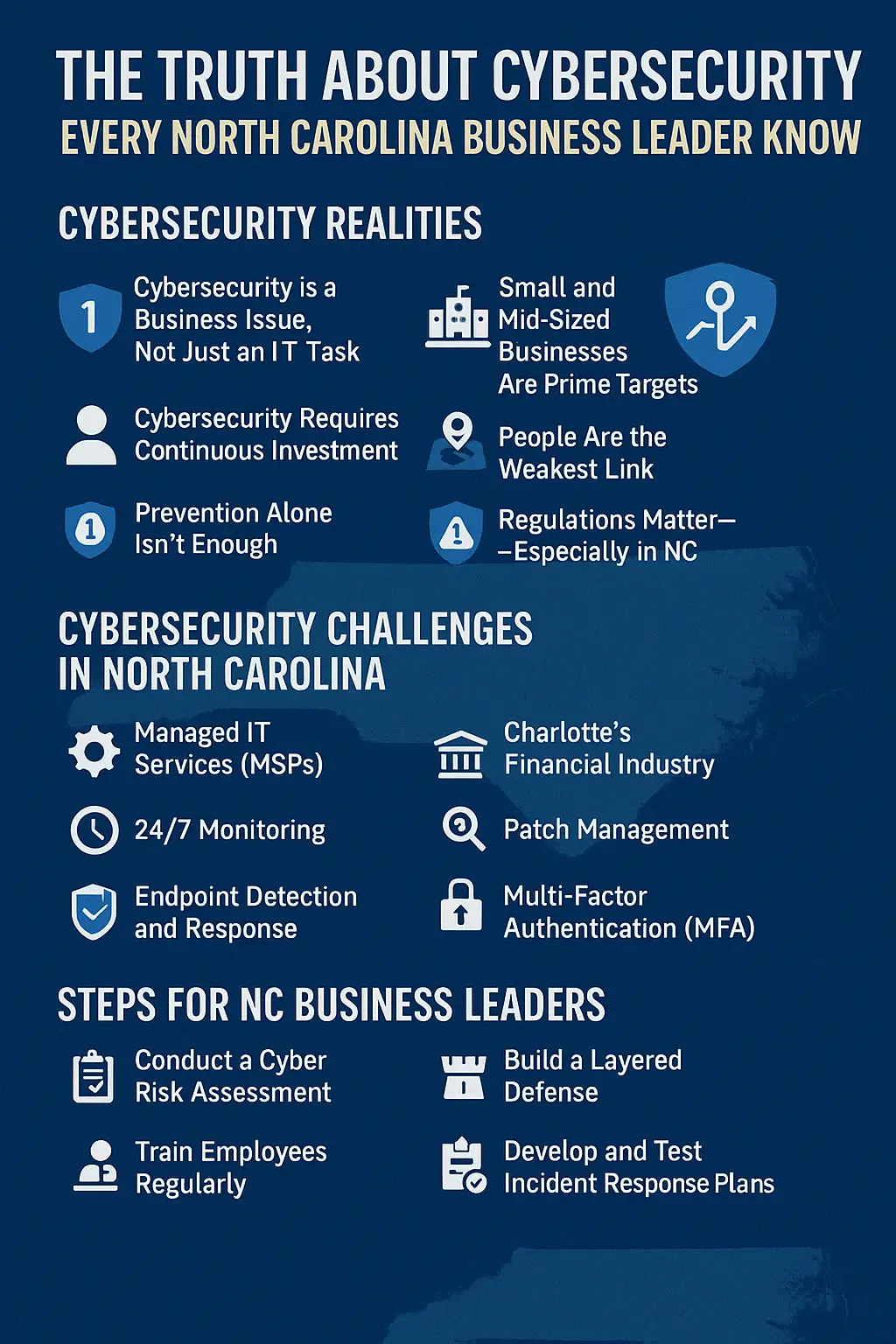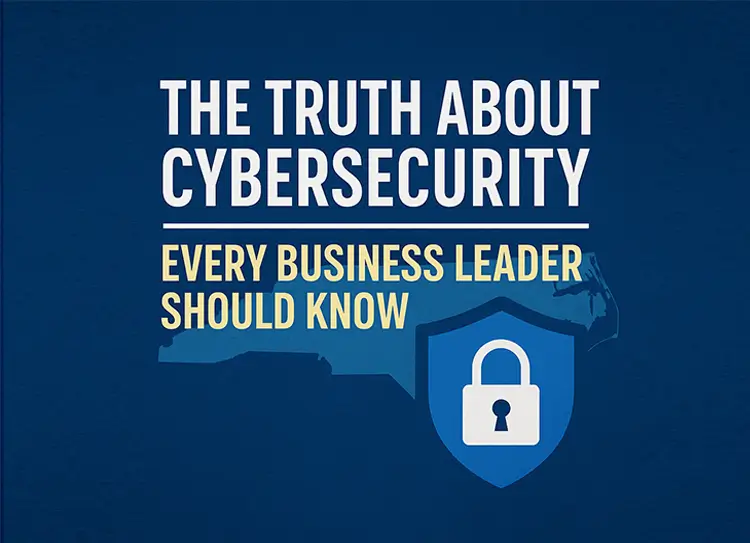The Truth About Cybersecurity Every Business Leader Should Know — A North Carolina Perspective
Why NC Business Leaders Must Pay Attention
North Carolina has emerged as one of the fastest-growing business hubs in the United States. From the Research Triangle (Raleigh, Durham, Chapel Hill) to Charlotte’s banking sector, and from Wake Forest’s tech startups to Asheville’s tourism and breweries, the state is home to a wide variety of thriving businesses.
Yet with growth comes risk. Cybercriminals see North Carolina’s bustling industries as prime targets. Over the past five years, ransomware attacks have disrupted schools, hospitals, city governments, law firms, and manufacturing plants in the state.
For NC business leaders, the truth is clear: cybersecurity is no longer an IT problem—it’s a boardroom priority.

The Truth About Cybersecurity Every Business Leader Must Know
Let’s break down the core truths that separate myth from reality:
- Cybersecurity is a Business Issue, Not Just an IT Task
A ransomware attack on a Raleigh healthcare provider isn’t just a “computer issue.” It’s patient safety, HIPAA compliance, and brand reputation. Similarly, a phishing breach at a Charlotte financial firm could lead to regulatory fines, lawsuits, and loss of client trust.
Truth: Cybersecurity is risk management, not a side project.
- Small and Mid-Sized Businesses Are Prime Targets
North Carolina’s SMBs make up the bulk of the economy—and attackers know it. Criminals often assume that smaller firms lack strong cybersecurity defenses, making them easier to exploit.
Example: A Cary-based law firm thought they were too small to be noticed. After an employee fell for a phishing email, sensitive client files were exposed. Recovery took months and damaged the firm’s reputation.
- Cybersecurity Requires Continuous Investment
Threats evolve daily. What worked last year won’t protect you today. Firewalls, antivirus, and basic backups are no longer enough. Continuous monitoring, patching, and testing are the new baseline.
Analogy: Think of cybersecurity like your health. An annual doctor’s visit helps, but ignoring diet and exercise in between leads to disaster.
- People Are the Weakest Link
From Chapel Hill to Wake Forest, employee mistakes are behind the majority of cyber breaches. Clicking on a malicious link, downloading a rogue attachment, or reusing a weak password is often all it takes.
Truth: Human error, not hackers’ brilliance, is often the biggest risk.
- Regulations Matter—Especially in NC
North Carolina enforces the Identity Theft Protection Act and Breach Notification Law, which require prompt notification to affected individuals if their data is compromised. Healthcare, finance, and education also face strict federal compliance requirements (HIPAA, FINRA, FERPA).
Truth: Cybersecurity negligence can lead not only to downtime, but also legal penalties.
- Prevention Alone Isn’t Enough
Even well-defended businesses in Charlotte and Raleigh have been breached. The real difference comes from whether leaders have incident response plans: backups, communication strategies, and recovery procedures.
Truth: Resilience matters as much as defense.
Cybersecurity Challenges Unique to North Carolina
- Ransomware on Public Infrastructure
- Durham City Government shut down services after a ransomware attack.
- Wake County Schools saw student learning disrupted by cyber incidents.
- Healthcare Sector Threats
North Carolina’s hospitals and clinics are frequent ransomware targets because medical records fetch a high price on the dark web. HIPAA violations add extra costs.
- Charlotte’s Financial Industry
As the second-largest banking hub in the U.S., Charlotte is an attractive target for wire fraud, phishing, and insider threats.
- Manufacturing and Supply Chain Risks
NC’s manufacturing sector ties into global supply chains. A single breach can halt production, leak trade secrets, or cascade through vendors.
How Cybersecurity Services and IT Support Help NC Businesses
Managed IT Services (MSPs)
North Carolina businesses increasingly partner with local IT Services providers to manage cybersecurity. A strong MSP offers:
- 24/7 monitoring and threat detection
- Endpoint detection and response (EDR)
- Patch management and updates
- Secure cloud management
- Encrypted backups stored offsite
- Disaster recovery tested regularly
Local IT Support Benefits
Unlike large national providers, local firms understand NC’s unique risks and regulations. They can:
- Provide fast on-site support in Raleigh, Cary, Durham, Wake Forest, and Charlotte.
- Offer compliance training for HIPAA, FINRA, FERPA.
- Tailor solutions to industry and size (from law firms to breweries).
Cybersecurity Services to Demand
- Multi-Factor Authentication (MFA)
- Network segmentation
- Vendor risk management
- Security awareness training
- Incident response planning
- Cyber insurance support
Steps Every NC Business Leader Should Take
- Conduct a Cyber Risk Assessment
Identify critical assets: customer records, financial data, intellectual property. - Build a Layered Defense
Firewalls + MFA + backups + monitoring = strong foundation. - Train Employees Regularly
Simulated phishing tests and workshops keep security top of mind. - Develop and Test Incident Response Plans
Run tabletop exercises—know who does what if an attack occurs. - Ensure Regulatory Compliance
Stay aligned with NC Identity Theft Protection Act and sector-specific laws. - Budget for Cybersecurity
The cost of prevention is a fraction of breach recovery costs.
Real-World NC Case Studies (Expanded)
- Durham County Government (2019): Ransomware forced critical services offline. Costly recovery highlighted the need for stronger backups.
- Wake County Public Schools (2020): Attackers exploited weak access controls, exposing student data. Lesson: MFA and access reviews are essential.
- Charlotte Law Firm (2022): Prevented a phishing-based wire transfer fraud because their IT Support provider had implemented MFA and staff training.
The Future of Cybersecurity in North Carolina
- AI-Driven Threats and Defenses: Attackers use AI to craft realistic phishing; defenders use AI for anomaly detection.
- Tighter Cyber Insurance Requirements: Providers demand evidence of layered defenses before issuing policies.
- Remote/Hybrid Work Security: More devices, networks, and risks.
- Statewide Cybersecurity Collaboration: NC is investing in public-private partnerships to defend local infrastructure.
Choosing the Right IT Services Partner in NC
When evaluating IT Support and cybersecurity providers in North Carolina, ask:
- Do they offer 24/7 monitoring?
- Can they support compliance needs (HIPAA, FINRA, FERPA)?
- Do they provide regular training for employees?
- Do they test backups and disaster recovery systems?
- Are they based locally with onsite support availability?
The Cybersecurity Truth Every NC Business Leader Should Live By
Cybersecurity is not optional—it’s a business survival requirement. For North Carolina businesses, the risks are real, the regulations strict, and the stakes higher than ever.
By embracing cybersecurity services, IT support, and managed IT services tailored to the NC landscape, leaders can move from fear and uncertainty to confidence and resilience.
Whether you’re running a financial firm in Charlotte, a healthcare practice in Raleigh, or a brewery in Durham, the truth remains: your future depends on the security decisions you make today.

